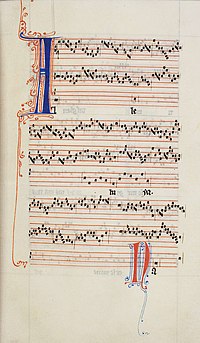Pérotin
Pérotin (lived around 1200), was a medieval composer. He was probably French. Nothing is known about his life except that he worked in or around Paris in the late 12th century to early 13th century. People have tried to find out who he was by studying the archives of Notre Dame Cathedral, but his name has not been found there. He probably had another name, and used the name Pérotin for his compositions.

Pérotin worked on a very important collection of polyphonic music called Magnus Liber (meaning: Big Book). The composer Léonin had written a lot of this music. He may have been Pérotin's teacher, but we do not know. He seems to have written music for four voices which are settings of words for the Feast of the Circumcision and St Stephen's Day. He wrote three and four voice music of a type called organum. It was a very important development in the history of Western music. He wrote music in a polyphonic style. Often he took a tune and arranged it so that one voice sang it incredibly slowly while another voice sang something much faster on top.
It is difficult to work out any dates for his works because of the way the music was written. Often it is not even clear what mode they are in.
Pérotin's music has been an influence on some 20th century composers who wrote minimalist music such as Steve Reich.
References change
- The New Grove Dictionary of Music and Musicians, ed. Stanley Sadie. 20 vol. London, Macmillan